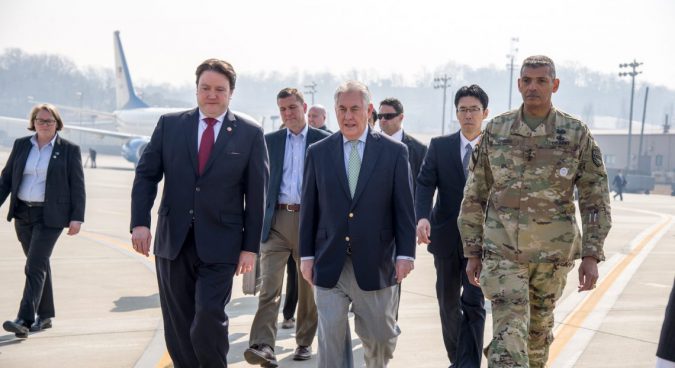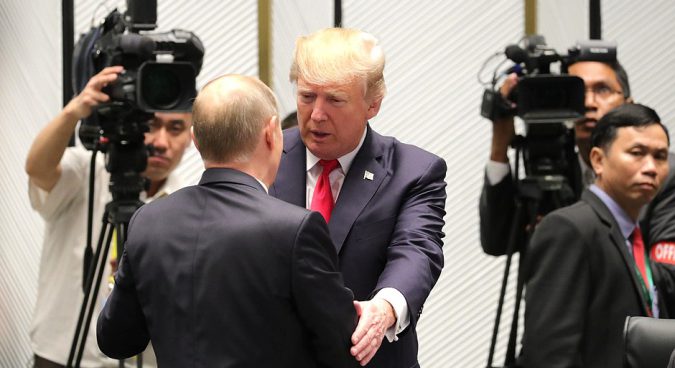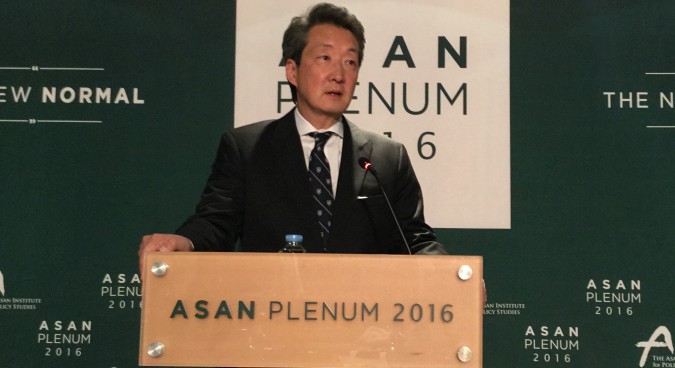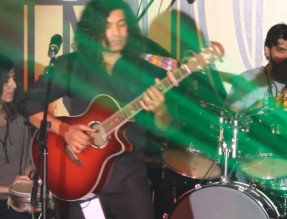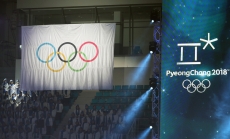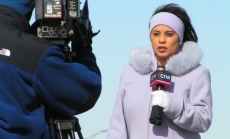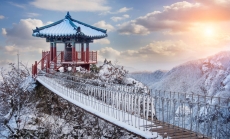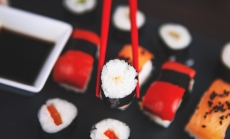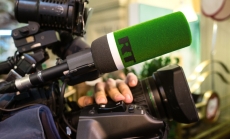Since then, Park Geun-hye was impeached, Moon Jae-in rose to power, and North Korea conducted over 20 missile launches as well as its sixth nuclear test.
And yet as international sanctions correspondingly strengthened – spearheaded in large part due to pressure from Washington – inter-Korean talks came almost out of nowhere this January, something the South Korean president was, however, quick to credit to Donald Trump for personally.
Yet throughout this one year period – one of the most turbulent years surrounding the peninsula in recent decades – the U.S. has lacked an ambassador in Seoul, with the embassy being temporarily led by Chargé d’Affaires ad interim Marc Knapper.
Such a long period without an ambassador in Seoul is unusual. Since the George H.W. Bush administration took office in 1989, no vacancy of the post has ever extended beyond nine months.
From a big picture perspective, it’s true that the Trump administration has not shown any real urgency about filling important executive branch roles: only 241 of 635 key positions requiring Senate confirmation have been confirmed a year since inauguration. Such a long period without an ambassador in Seoul is unusual
But while some 60 ambassador roles remain to be filled worldwide, as of January 12, according to the Department of State, the Seoul vacancy is particularly glaring in light of the fact the Senate confirmed nomination picks for ambassadors to China and Japan – two other principal stakeholders on the North Korea issue – by July 2017.
Marc Knapper (front, left) has carried out many of the ambassador’s official duties | Photo: U.S. embassy in Seoul
What, then, is the cost of the U.S. ambassador post remaining unfilled for so long, with no immediate prospects for a candidate like Cha to arrive in Seoul?
“It’s a particularly strange posting not to fill, given the importance of coordination with Seoul and the need for public diplomacy towards South Korean citizens,” said Andray Abrahamian, a visiting fellow at the CSIS Pacific Forum.
“So much of diplomacy is about signaling and this current situation certainly doesn’t indicate to South Koreans that those things are being focused on.”
Local watchers in Seoul agree to some extent, but said the overall picture remained largely positive.
“The absence of the U.S. ambassador has triggered worries in South Korea,” Dr. J. James Kim at the Asan Institute for Policy Studies, told NK News.
2018, in particular, could pose challenges due to several pending issues between the two countries, Dr. Kim continued, such as “defense cost sharing, free trade agreement (FTA), and the North’s nuclear armament…”
Meanwhile, Kim Hyun-wook, an associate professor of the Korea National Diplomatic Academy which educates the South’s diplomats, said the absence of a U.S. ambassador had “lowered the quality” of contact between the two countries.
With President Trump’s provocative language about the North raising concerns in the South, as well as concerns in DC growing over the Moon administration’s approach to welcoming North Korea to the Olympics, it’s not a good time for a disconnect to emerge in understanding between the two countries. “The absence of the U.S. ambassador has triggered worries in South Korea”
But despite the lack of an ambassador, official communications between the two countries have continued without any real hindrance, an official at South Korea’s Ministry of Foreign Affairs (MOFA) focused on North America told NK News.
President Trump’s unconventional style has made diplomacy all the more important | Photo: Kremlin.ru
“It would be better if we had a U.S. ambassador, but there is no problem in the two countries’ communications,” the source said.
And things have been helped by the fact that Knapper has been a “very good” chargé d’affaires, the source continued, adding that communication between the two countries is “very smooth.”
However, Knapper’s position as top diplomat at the embassy came from the void of Obama-pick Lippert’s departure, meaning he was “not appointed by President Trump,” said David Straub, an LS research fellow at the Sejong Institute in Seoul.
As a result, he has to be “careful” and his activities have to be “less public” and “less outspoken,” something which makes a”significant difference,” Straub explained.
Nevertheless, the countries can always communicate via South Korea’s embassy in the U.S., as well as via counterpart talks such as at president-to-president or minister-to-minister level, another MOFA spokesperson told NK News.
And for structural reasons, it appears no significant problems are likely to arise.
For when looking back at 2017, Asan’s Dr. Kim said overall U.S.-South Korea relations and communications were well managed, evidenced by the fact the countries conducted two successful summits since Trump came to power.
“It would be better if we had a U.S. ambassador, but there is no problem in the two countries’ communications”
The U.S-South Korea alliance is very “systematic” and therefore “stable,” Dr. Kim explained, with high-level communication between the two countries’ presidents much more important than the existence of an ambassador in Seoul.
WHAT’S CAUSING THE DELAY?
Rumors about a likely role for Victor Cha in the Trump administration – himself a former NSC senior director during the George W. Bush era – have been circulating since the Washington Post’s Josh Rogin named him as having being tapped for the posting in April last year. But while Cha’s name has since been explicitly linked to the ambassador post in multiple news reports – and despite the hiring of Sue Mi Terry to join CSIS as a Senior Fellow, a potential successor figure for his Korea Chair responsibilities – the U.S. government is yet to formally nominate him to the post. Victor Cha is seen as the likely candidate| Photo: Ha-young Choi
For now, the appointment of Cha as ambassador to South Korea is nothing more than a “rumor”, the MOFA official said, neither denying nor confirming if his appointment was true. Until the White House officially announces the nomination, MOFA won’t be able to confirm it, the source said.
And for their parts, both the Department of State and U.S. embassy in Seoul also declined to confirm any plans surrounding the ambassadorial appointment.
However, the U.S. government actually obtained South Korea’s official agreement – a so-called agrément – to appoint Cha as ambassador to Seoul about a month ago, according to Straub, attributing the information to U.S. government officials.
It is a “mystery,” then, why the White House still has not passed on Cha’s appointment to the Senate for approval, said Straub, a former U.S. Department of State diplomat with decades of experience on Korea.
Dr. Kim of the Asan Institute speculated the delay could be linked to Cha’s breadth of experience concerning the job, with a “huge amount of documents” likely needing to be reviewed as part of clearance processes.
Kim Hyun-wook, the associate professor at the Korea National Diplomatic Academy, said that the delay was not exceptional, drawing attention to broader human resource management issues that the Trump administration had encountered since its early days. President Trump is known to have rejected many of the recommended candidates for governmental positions due to his personal taste, he said.
And Abrahamian, the Pacforum fellow, said “overall, Trump has done a poor job of alliance maintenance when it comes to Korea.”
“Just before the Olympics would be a great time for the Trump Administration to finally get someone in position to signal that during all the North Korean outreach, the U.S. will be there and remains a good partner,” he said. “Will that happen? Who knows.”
Whatever the reason for the delay, it appears that Washington is happy with its current representation.
“We have a charge d’affaires in South Korea…(and) we are confident that our embassy there is in good hands,” a Department of State spokesperson told NK News.












